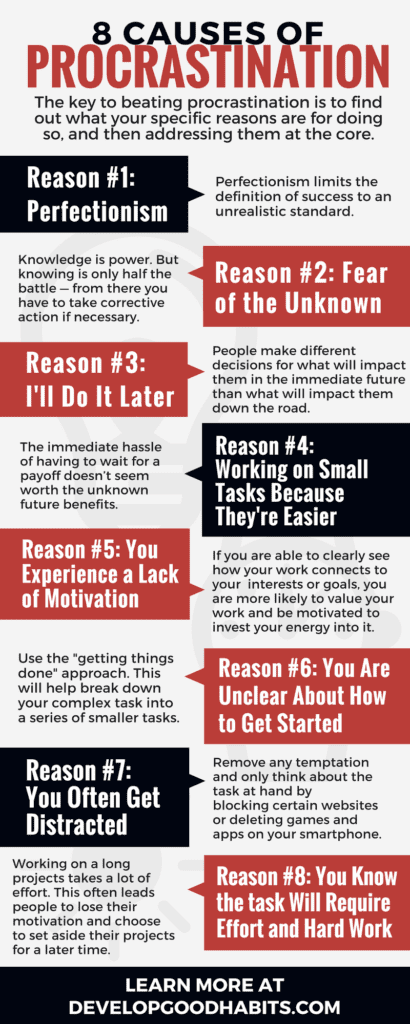There might be affiliate links on this page, which means we get a small commission of anything you buy. As an Amazon Associate we earn from qualifying purchases. Please do your own research before making any online purchase.
Don't you hate it when you have something you need to do, but you just don't want to do it or you can't get yourself motivated?
Everyone procrastinates at some point, but some people avoid their unwanted obligations so much that it results in a downward spiral of emotions that has a snowball effect.
So, what causes people to procrastinate and put off difficult tasks?
One of the main reasons that procrastination is a challenge to overcome is that everybody has a different reason for doing it.
What's more, the same person may have a variety of reasons for procrastinating on different tasks. Procrastination excuses are common as the cold.
Maybe you feel too tired to call your grandmother to check in, and figure “there is always tomorrow.” Or, maybe you always find yourself to be too busy to start that hobby that you have been interested in doing.
The key to beating procrastination is to find out what your specific reasons are for doing so, and then addressing them at the core. So if you really want to discover “why do people procrastinate”, then let's explore the following 8 causes of procrastination.
Let's get to it…
Reason #1: Perfectionism
Perhaps you are worried you might make a mistake in your work and expose a weakness.
The fear of making mistakes is a real thing, and it can cause people to put off some of their important obligations for another day.
(If you're someone who fears failure, then here is a 7-step process that you can use to grow and learn from your mistakes.)
Fear of making mistakes is a type of mindset that is addressed in Carol Dwick's Mindset: The New Psychology of Success. In this book, Stanford University psychologist Carol S. Dwick, Ph.D., details the power of one's mindset.
Dwick relates successes in school, sports, work, the arts, and other areas of human endeavor to how one thinks about their talents and abilities.
Dwick explains that people either have a fixed mindset or a growth mindset. Those with a fixed mindset believe that their abilities are set in stone, so they only focus on their current intelligence or talents, believing they cannot be developed.
They believe that they were born with what they have, and they can't improve upon their abilities. People with a fixed mindset also believe that effort is not needed for success if someone has talent. They believe the talent just comes naturally.
So, why can a fixed mindset be dangerous? It hinders one's ability to grow, learn, and make positive changes.
Alternatively, a growth mindset allows a person to believe their abilities can prosper and be developed through dedication and hard work.
They believe that people's brains and talents are a mere starting point. They are born with their individual strengths, but there is no limit to what one can accomplish. The growth mindset creates a desire to learn and an ability to overcome problems in order to be successful.
Dwick explains that one's mindset reveals how great teachers, parents, and managers can advance in their careers and achieve great accomplishments. With the correct mindset, one can motivate, lead, and teach in a way that can positively change their life and the lives of others.
According to Hillary Rettig, the author of The 7 Secrets of the Prolific: The Definitive Guide to Overcoming Procrastination, Perfectionism, and Writer’s Block, people who procrastinate due to perfectionism tend to have a fixed mindset.
This means that they avoid doing certain tasks because they fear the risk of making a mistake and looking anything less than perfect. They want their work to be perfect. Because they believe that they will inevitably fail if the task is not in line with their given talents, it is best to set it aside for another time.
While some may think that being a perfectionist is a positive trait, it is actually quite detrimental. It is a dangerous mix of anti-productive habits and attitudes that discourage progression.
Although often misunderstood as having high standards, perfectionism limits the definition of success to an unrealistic standard. This standard will never be achieved, so why try?
(If you'd like to cultivate a growth mindset at home, school, or work, then hang up one of these 25 growth mindset posters.)
Reason #2: Fear of the Unknown
Picture this: You notice one day that a new mole has appeared on your skin. You start to get anxious that it may be cancerous, so you avoid getting it checked out and just hope it goes away on its own.
Does this sound like you?
Sometimes people are afraid of taking action because it may reveal a truth that they do not want to hear.
As it turns out, the old phrase “What you don't know can't hurt you” isn't really true. In almost every case, if you ignore something for a long period of time, hoping it will go away, it will only get worse.
Researchers from the University of Michigan conducted a study on the effects of allowing misinformation to linger in someone's mind.
The study notes that misinformation remains in one's memory and continues to influence their thinking, even if the person is aware that they are mistaken.
The person is also likely to make use of the misinformation, especially if it fits with their existing beliefs and makes a logical story. This then leads to spreading the inaccurate information to other people.
This study applies to detriments in the environment, in politics, and on an individual level.
Having misinformation or preconceived notions about health issues such as “cancer does not run in my family, so I am probably fine” or “the mole will go away with time” can end up doing significant damage.
The researchers found that one's beliefs and personal values can be significant obstacles for changing believed misinformation. Additionally, an attempt to present someone with an unwanted truth that is against what they previously believed can even backfire and amplify their incorrect ideas.
When it comes to personal health issues, ignoring the problem instead of facing the truth can certainly lead to a more severe issue, and even death.
Think about it:
What if the mole is a form of cancer that is completely treatable during the early stages, but has the ability to grow malignant if it is ignored?
You could be proactive in getting the mole checked out and it would be an easy fix, or you could procrastinate because you want to assume everything is okay.
In this case, what you don't know certainly can hurt you, and your personal beliefs that it will go away on its own are detrimental.
Some other examples of this phenomenon include avoiding going to the dentist and continuing to tell yourself that the cavity that you suspect you have will be fine.
Maybe you don't want to do your taxes because, until you have to face the truth about owing money, you don't have to worry about it. Perhaps you avoid a conversation with your spouse to delay the argument that it may cause.

All of these causes of procrastination are quite common.
This all ties back to the findings of the researchers at the University of Michigan, because in these cases, the person doesn't want to know the truth.
They are more comfortable with the possibility that everything is fine. Ignorance is bliss, right? So sometimes we procrastinate just to stay ignorant and happy.
However, ignoring these situations can lead to grave circumstances.
What is the lesson here?
It's simple: Knowledge is power.
Even if you hear “bad news,” the earlier you hear it, the more opportunities you will have to overcome a potentially worse situation. Knowing is only half the battle — from there you have to take corrective action if necessary.
So, ask yourself these important questions, when you think about what's causing your feelings of procrastination:
Already know your fears but want to learn how to stop procrastination right now? Watch this video and you will learn about 5 simple habits you can build that will help you stop procrastinating:
Reason #3: I'll Do It Later
This common excuse is a reminder that you can work on the pending task later on.
You imagine that in just a few hours or a couple of days you will have the perfect opportunity to accomplish your goal. You have nothing that you know of that you have to do later on.
However, this creates a strong disconnect between how you will ideally feel in the future and how you will actually feel in the future.
Ideally, you will suddenly be gifted with boundless energy, eat a clean and healthy diet, exercise on a regular basis, and work well into the evenings in order to get everything finished.
However, the realistic future you is tired, unmotivated, worn out, handling unruly children, and craving chocolate cake.
This phenomenon relates to two concepts: the hot-cold empathy gap and dynamic inconsistency.
Let's explore each concept…

1. The Hot-Cold Empathy Gap
This is a state of mind that causes people to underestimate the influences of their instinctive drive on their attitudes, behaviors, and preferences.
The most important aspect of the hot-cold empathy gap is that human understanding greatly depends on one's state of mind.
For example, if someone is angry, it is hard for them to picture themselves being calm. If you are hungry, it is hard to think of yourself as being full.
The inability to minimize the empathy gap can cause negative outcomes in professional settings.
Examples include when a doctor is gauging the physical pain of their patient or if an employer is assessing how much paid leave an employee should get for a death in the family. These subjective decisions can easily be influenced by the hot-cold empathy gap.
Maybe the doctor had previously been in a similar accident as the patient and feels like they are overreacting to their pain, or maybe an employer also recently had a death in the family but was able to return to work relatively quickly.
These past experiences and feelings can have an influence on people's decisions.
Because the “future you” is unknown and you can't predict your feelings or moods that will happen in the future, this adds in a factor that could easily disrupt your plans to do something in the future.
Your mood may worsen or you may get into a state of mind that further keeps you from doing the task at hand.
2. Dynamic Inconsistency
A dynamic inconsistency is a situation where the decision maker's preferences vary over time, and their preferences become inconsistent.
This mirrors the idea that there are different varieties of oneself when making a decision. Each “self” represents the decision maker at a certain point in time, and the inconsistency happens when their preferences are not aligned.
This also adds the unpredictability factor into the future self. For example, the night before an exam, students tend to wish they had one more day to study. If the students are asked that night, some may agree to pay $10 for the exam to be postponed just one more day.
Alternatively, if asked months before the exam date, students generally don't feel the need to put the exam off. Consequently, they would not be willing to pay $10 to change the date of the exam.
While the choice is the same in both instances, it is made at different points in time. Because the decision of the student changes, they are exhibiting time inconsistency (case study).
Another example of a dynamic inconsistency was shown in a 1999 experiment. Here, subjects were offered a free movie rental. The movies fell into two categories: lowbrow (such as Austin Powers) and highbrow (such as Hamlet).
Researchers analyzed the patterns of the choices that the subjects made. Without dynamic inconsistency, one would expect that a subject would make the same choice regardless of when they made the decision versus when they were going to watch the movie. However, the decisions were different.
When subjects were asked to pick a movie to watch right away, most of the people chose to watch a lowbrow movie. However, when they were faced with the decision of which movie to watch in four or more days, 70% of the subjects chose a highbrow movie (case study).
What does this mean?
People's minds change over time, and the outcome of their decisions in relation to the point in time that the decision is being made can certainly have a strong effect on how people think.
People make different decisions for what will impact them in the immediate future than what will impact them down the road.
Reason #4: Working on Small Tasks Because They're Easier
This probably sounds familiar. Often we will choose to work on “filler” tasks because they are quick and easy to accomplish. This may include checking your email, talking to a co-worker, or doing some light paperwork.
While these tasks may make you look and feel busy, and make you think that you are getting a lot done, it is really just a creative form of procrastination. Small tasks are easy to do and give you a quick sense of accomplishment, so by doing them first, you are able to get instant gratification.
The more time and effort it takes to do a task, the more likely people will procrastinate on getting it done.
Without the instant dopamine rush from successfully finishing a task, it seems like the reward for working is just too far away. People want to feel successful and accomplished sooner rather than later.

Have you ever heard of the “Present Bias?” This term refers to one's tendency to prioritize payoffs that are more imminent when considering the trade-offs between two future moments.
One study done at Princeton University studied subjects' brains while they made choices between immediate small rewards and larger rewards to be received at a later date.
Researchers found that there are two areas of the brain that compete for control over one's behavior when someone tries to decide between near-term rewards and long-term goals.
The researchers turned to a popular economic dilemma, wherein consumers act impatiently at the present moment but plan to be patient in the future. For example, if someone is offered the choice of receiving $9 today or $10 tomorrow, they are likely to take the $9 and walk away.
However, if someone is given the choice between receiving $9 one year from the offer date or $10 in a year and a day, the person will likely choose the higher amount that is slightly delayed.
The procrastination study focused on 14 Princeton University students who were given a brain scan as they were asked to consider delayed reward choices.
One example of a choice that students were offered was if they would take a gift card to Amazon.com with values ranging from $5 to $40 at that moment, or an unknown larger amount that they could receive if they waited a certain period of time, ranging from two to six weeks.
The researchers found that when subjects were considering choices involving the possibility of an immediate reward, parts of their brain were activated that are heavily influenced by neural systems associated with emotion.
Additionally, all of the decisions that were made, both short- and long-term, activated the brain systems associated with abstract reasoning.
Interestingly, when students had the option of getting a short-term reward but chose the more valuable delayed option, the calculating areas of their brains were more active than their emotional areas.
When subjects chose the short-term reward, the activity of the two areas was similar, with a small swing toward more activity in the emotional area.
The study concluded that the option of short-term rewards activates the emotion-related area of the brain and overcomes the abstract-reasoning areas.
The researchers decided that one's emotional brain has a difficult time imagining the future, regardless of the fact that our logical brain can see the future consequences of current actions.
While one's emotional brain wants to receive immediate pleasure, no matter the future damage, our logical brain knows to think about long-term effects. More often than not, the immediate hassle of having to wait for a payoff doesn’t seem worth the unknown future benefits.

Reason #5: You Experience a Lack of Motivation
Have you ever thought to yourself that life has just gotten in the way, and so you haven't been able to do what you were supposed to do? This lack of motivation can come from several underlying causes, including:
A study done at Carnegie Melon University revealed that people lack motivation when they find little value in the projected outcome of their work.
However, if people are able to clearly see how their work connects to their interests, goals, and concerns, they are more likely to value their work and be motivated to invest their energy into it.
Another study, published in The National Academics of Sciences, Engineering, and Medicine, notes that motivation is composed of two components: self-confidence and goal choice.
Self-confidence is not motivating on its own, but rather a judgment about one's capabilities for their accomplishment of the goal at hand. Self-confidence is therefore considered to be a part of a larger conceptualization of motivation of achieving the ultimate goal.
Reason #6: You Are Unclear About How to Get Started
What if the task at hand is too complex, unique, or difficult? What if it has a lot of moving parts, making it unclear where to begin? This uncertainty may keep you from starting because you don't know your first step.
Even if you can figure out the first step, once you are considering the process as a whole, you realize that you have underestimated the level of time and commitment that is needed to complete this task.
What's the best way to overcome this? A very effective method is to use the “getting things done” approach. This will help break down your complex task into a series of smaller tasks. There are five steps to doing this:

You can even take these steps farther by creating a checklist and getting the satisfaction of checking things off as you go. I know it has been really helpful for me to create a long checklist when writing books so I know that I don't overlook something that I once found to be important.
If you'd like a tool and a step-by-step process, then check out my Todoist tutorial, which shows you how to create projects and turn them into create simple-to-complete tasks.
Reason #7: You Often Get Distracted
Let's dive into some of the modern-day distractions that we are faced with:
A recent survey conducted by Career Builder found that one in five employers believe that their workers spend under five hours each day being productive.
When looking for a reason for this, over half of the employers say that workers’ smartphones are the first thing to blame, closely followed by the Internet and gossip around the workplace.

So, what are some solutions to keep these procrastination causing distractions at bay?
If you can always find a distraction when you are trying to focus, it is important to remove any temptation and only think about the task at hand. Some ways of doing this include:
To learn more, here are 11 strategies you can use to stay productive while working.
Reason #8: You Know the Task Will Require Effort and Hard Work
Working on a long project can be really difficult because of the amount of effort that it takes to finish.
There are also opportunity costs along the way where you have to give up something you would rather be doing to get some work done on your project. This often leads people to lose their motivation and choose to set aside their projects for a later time.
People are very protective of their time, and often value their personal time more than money or goals. This can result in “delay discounting.”
As shown in one study, on average, people view receiving $100 three months from the offer as worth the same as receiving $83 at the time of the offer. This means that most people would prefer to lose $17 than to wait three months to get a larger sum of money.
“Time inconsistency” is also a factor in putting forth an effort. Time inconsistency refers to the idea that a leader can create a policy rule that causes people to make commitments, thinking the policy rule will stay in place. The leader can later change the policy rule with the commitments already being fulfilled by people.

For example, a professor may announce an exam for the following week. The students will then study in order to prepare for the exam. However, on the exam date, the professor cancels the exam.
The exam is then unnecessary, but the announcement of the exam was beneficial. The students have already studied the material, and the class can use the time scheduled for testing to learn new material. Additionally, the professor does not have to spend time grading the exams.
One study performed at Stanford University found that time inconsistency is a major factor in individual work. People tend to have a present bias when they are working on tasks that they have full control over.
This means that they value their current time over future results. This is due to the fact that the brain values immediate rewards (in this case, free time) over future rewards.
This is one of the main reasons why many people procrastinate, and is, in fact, one of the biggest predictors of future success.
One project done by Walter Mischel at Stanford University looked at a series of studies that were done on delayed gratification. During these studies, a child was presented with a choice between receiving a small reward right away or two small rewards in 15 minutes.
The researchers took note of the children's choices and followed up with future studies years later. The study found that children who chose to wait longer for the larger reward tended to have better overall success in life.
Alternatively, those who did not choose the delayed gratification had more behavioral problems in school, higher BMIs, and lower educational attainment.
Final Thoughts on the Causes of Procrastination
Everyone has a different reason for their procrastination.
The causes of procrastination follow a general pattern, but individuals may procrastinate for multiple reasons, sometimes mixing and matching different procrastination causes.
The key to overcoming the problem is to identify your personal reasons and take action accordingly.
Remember, your reasons for procrastinating on various tasks may change depending on what you are required to do. Stop and do a realistic self-evaluation to determine what you need to do to stop procrastinating.
Now if you'd like to learn how to fight against these causes of procrastination, then I recommend checking out these blog posts:
- 14 Daily Practices to Overcome Procrastination
- 15 Top Books on Overcoming Procrastination and Laziness
- 7 TED Talks on Procrastination
- 11 Best Apps to Help You Overcome Procrastination
Finally, if you want to level up your productivity and time management skills, then watch this free video about the 9 productivity habits you can build at work.




You left out: “It is easier to say that I didn’t get around to it, than to risk that people might not like it.”
I guess that this a combination of some of the ones you listed, but it is the main reason for me putting off so many things…
Tracy,
Maybe it is a bit of a “tight squeeze” but I would place that under #1 Perfectionism. Feeling that others will judge because it may not be good enough. That, or forms of that are the most common reasons for procrastination. Not laziness, but having standards that are just too high and not wanting to release anything until it is PERFECT for others to see. (which it never will be)
Thanks for a great comment Tracy
Hey, Scott! This is an epic post and I love how you make each reason specific. Indeed, the top reason why many people procrastinate is due to perfectionism, which I guess plagued most. Among the reasons you have given, this is the most common and I could say has the highest number. It is because we think people fear FEAR itself.
They fear people criticized them for their inevitable mistakes they have in their blog posts or in their respective office work, for example. From there, it connects with your next point which is FEAR OF THE UNKNOWN. Before they could even start something, they already fear that something that doesn’t even exist. YET. People immediately assume something bad about something they’re working on. Be it their dreams or achieving their goals, either way, stops them from moving forward.
So, I really agree with you, Scott. And I thank you so much for posting this. Before I end my comment, I’d like to ask you. Have you ever procrastinate and what did you usually do to overcome it, especially as an owner of a big site like this? 😀
Looking forward to your thoughts with high hopes of you recognizing this comment. *fingers-crossed*
Cheers,
Mecyll
Founder, Building Self
Mecy,
Sorry for the slow reply. But that is actually part of the answer to your question about procrastination.
Yes, I have procrastinated before, up until my late 20’s I was pretty bad about procrastination. What keeps me from 99% of procrastination is having a rock solid system in place. I don’t try to do everything, every day. I write every day, but other than that I have one loose “task” per day. So there is only one day every 8-9 days where replying to messages is on my list, since this is a low 80/20 return for me.
This gives me both the family time I need AND the rigid system that helps me focus. I hope that answers your question.
I believe what you said was very logical. However, think on this, what if you were
to create a awesome headline? I am not suggesting your content isn’t good., however
what if you added a title that grabbed people’s attention? I mean 8 Causes of Procrastination (Backed by Science and Psychology) is a little vanilla.
You ought to look at Yahoo’s front page and see how they create post headlines to
get viewers to click. You might try adding a video or a pic or two to get readers excited about everything’ve written. Just my opinion, it could make your posts a little bit more
interesting.